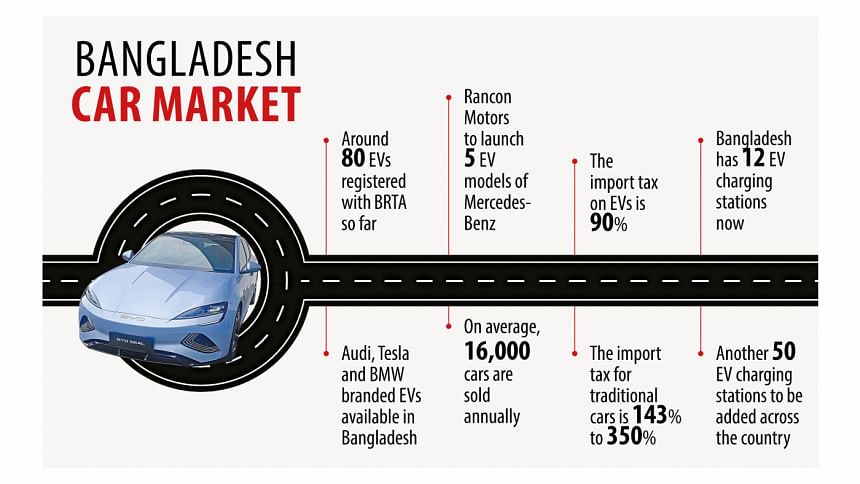Electric vehicles etching their way into domestic automobile industry

The automobile industry of Bangladesh is seeing a notable shift towards electric vehicles (EVs) with BYD Auto Co Ltd, the world's biggest EV maker, set to launch its Seal model on the domestic market.
CG-Runner Bangladesh, an authorised distributor of BYD, will roll out the premium passenger sedan on March 2 and later introduce electric SUVs, buses, trucks and other vehicles produced by the Chinese automaker.
The BYD Seal is equipped with a battery capacity of 82.5 kilowatt hours and can travel 540 kilometres at full charge, which can be achieved in 40 minutes using its fast charging capability.
CG-Runner is a collaboration between Chowdhury Group, a leading conglomerate of Nepal, and Runner Group, a local company that pioneered two-wheeler and three-wheeler manufacturing in Bangladesh.
The company is also developing a nationwide charging network with the help of Genex Infrastructure Limited, with the two having signed a memorandum of understanding to this end on January 16.
Amid Shakif Khan, director of marketing at Runner Group, said they would launch the BYD Seal through a ceremony at the International Convention City Bashundhara in the capital's Purbachal.
"We will disclose the car's price at the event, where top officials of BYD and Chowdhury Group will be present," he added.
Khan also informed that the Atto-3, an SUV designed by the Chinese brand, will also be brought to Bangladesh within the next three months.
Khan said it was currently impossible to determine how much customers would have to spend on maintaining EVs considering the absence of a finalised government policy regarding EV registration and charging costs.
Currently, EV imports are taxed at 90 percent while other cars are taxed from 143-350 percent depending on the engine capacity.
However, industry people hope the government's objective to gradually phase out traditional fossil fuel-powered cars will help bring down such expenses through subsidies and incentives.
Khan added that they would eventually introduce budget-friendly models to cater to the mass market.
Shanat Datta, CFO of Runner Automobiles, said EVs are environmentally friendly as they reduce dependence on fossil fuels.
"There is an opportunity to speed up our industrial development, diversify exports and create more jobs by ensuring the research and development of the latest technologies, such as EVs," he added.
BYD is currently the world's leading manufacturer of new energy vehicles (NEVs), with the company's sales in the segment having increased 208.6 percent year-on-year to 1.863 million units in 2022.
In China, the term new energy vehicle (NEV) is used to designate automobiles that are fully or predominantly powered by electric energy.
Similarly, the automaker's NEV sales had edged up by 64.8 percent to 2.683 million units last year.
At present, BYD has operations in about 400 cities across 70 countries.
Now, the company is set to pioneer the NEV segment in Bangladesh with its highly integrated designs for the next generation of "pure" electric vehicles.
On October 8 last year, BYD organised a programme styled "BYD SEAL Asia Pacific Track Day" at the BYD Museum in Shenzhen, where they briefly explained why they are interested in entering Bangladesh.
Speaking at the event, Liu Xueliang, general manager of BYD's Asia Pacific Auto Sales Division, said there is a good scope for EV sales in Bangladesh.
This is because the 'Mujib Climate Prosperity Plan' aims to ensure that at least 30 percent of all cars in Bangladesh are battery-powered by 2030.
Besides, Bangladesh plans to reduce its carbon emissions by 15 percent by 2030.
Also, using EVs offers several benefits, including lower operating costs, reduced maintenance costs, and government incentives, Liu added.
According to data from the National Board of Revenue (NBR), about 8,650 cars were imported during the July-December period of the current fiscal year, with new cars making up just 1 percent of the imports.
About 80 percent of the imported cars are Toyota-branded while Honda and Nissan contribute 7 percent each. The remaining 6 percent is made up of models designed by Mitsubishi and other brands.
However, car importers say the demand for EVs is still low.
Only 14 electric vehicles, from brands such as Audi, Porsche, Morris Garages, BMW, Tesla, and Mercedes-Benz were imported in the last six months.
The NBR data also showed that a total of just 79 EVs have been imported since 2018.
Runner Group's Khan said EV sales would gradually increase in Bangladesh as the government is taking several initiatives to reduce fossil fuel consumption.
Apart from Chinese manufacturers, Indian companies are also entering the market with electric buses and mini-trucks. Overall, the electric car market will likely see significant growth in the days ahead, he added.

 For all latest news, follow The Daily Star's Google News channel.
For all latest news, follow The Daily Star's Google News channel. 




Comments